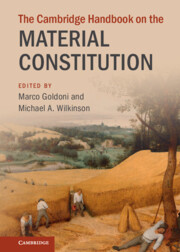
-
Select format
-
- Publisher:
- Cambridge University Press
- Publication date:
- January 2023
- January 2023
- ISBN:
- 9781009023764
- 9781316519462
- Dimensions:
- (254 x 178 mm)
- Weight & Pages:
- 0.93kg, 394 Pages
- Dimensions:
- Weight & Pages:
- Series:
- Cambridge Law Handbooks
- Subjects:
- Constitutional and Administrative Law, Law: General Interest, Law, Philosophy, Political Philosophy
- Collection:
- Cambridge Law Handbooks
You may already have access via personal or institutional login- Series:
- Cambridge Law Handbooks
- Subjects:
- Constitutional and Administrative Law, Law: General Interest, Law, Philosophy, Political Philosophy
- Collection:
- Cambridge Law Handbooks
Book description
Despite a long and venerable tradition, the material constitution almost disappeared from constitutional scholarship after the Second World War. Its marginalisation saw the rise of a normative and legalistic style in constitutional law that neglected the role of social reality and political economy. This collection not only retrieves the history and development of the concept of the material constitution, but it tests its theoretical and practical relevance in the contemporary world. With essays from a diverse range of contributors, the collection demonstrates that the material constitution speaks to several pressing issues, from the significance of economic development in constitutional orders to questions of constitutional identity. Offering original analyses supported by international case studies, this book develops a new model of constitutional reality, one that informs our understanding of the world in profound ways.
Contents
Metrics
Altmetric attention score
Full text views
Full text views help Loading metrics...
Loading metrics...
* Views captured on Cambridge Core between #date#. This data will be updated every 24 hours.
Usage data cannot currently be displayed.
Accessibility standard: Unknown
Why this information is here
This section outlines the accessibility features of this content - including support for screen readers, full keyboard navigation and high-contrast display options. This may not be relevant for you.
Accessibility Information
Accessibility compliance for the PDF of this book is currently unknown and may be updated in the future.


